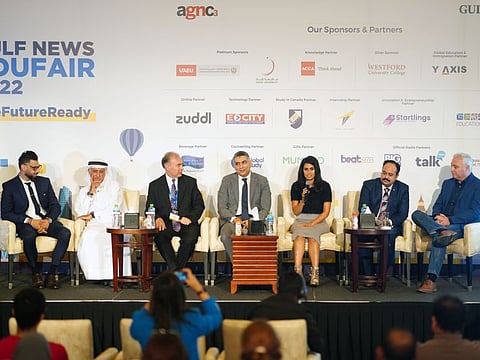Gulf News Edufair 2022: Lifelong learning is new mantra for successful careers, experts say
Multiple skill sets, career paths vital in today’s disruptive job market, say panellists

Dubai: Lifelong learning is more important today for career success and students will have to develop multiple skills for a successful future, an expert panel said on the final day of Gulf News Edufair on Thursday in Dubai.
In a fast changing world with rapid technological disruption, lifelong learning will be the mantra to help individuals adapt and become resilient in facing future career challenges, they observed.
Daniel Adkins, Group CEO, Transnational Academic Group, Curtin University Dubai said: “We as professors and lecturers have to ignite a passion for learning in our students. By demonstrating that in ourselves, we need to let them know we’re lifelong learners, so that they will become that as well.”
Dr Eesa Mohammed Bastaki, President, University of Dubai said: “We are in an age of students who know about technology, even more than their professors. So what we need to do is to use their tools for them to love to learn. Once you make them love to learn, you have already attracted them to lifelong learning.”
Impact of pandemic
Dr Bastaki added that the COVID-19 pandemic has had a fast track impact on technology and education. He said the experience so far has proved that blended learning will be the future preferred by most students.
Mohammad Meraj, head of Academic Professional Services and Quality and Lecturer in Business, Middlesex University Dubai, said the need of the hour is to engage students in conversations about why they need to learn their subjects and different skills and how they need to be prepared for jobs that will be impacted by technological advancements in the future.
“It is that conversation that needs to be had with students, schools, higher education practitioners and industry in general,” he said.
Roshini Barot, manager, Employer Engagement and Skills Development, University of Birmingham Dubai, said that there is an increasing appetite amongst both students and industry for entrepreneurial skills, whether or not a student may want to start their own business after graduating.
“If COVID-19 has taught us anything, is that we need to be resilient, we need to be adaptable, and we need to be innovating all the time. So one piece of advice I would always give to a student looking for a new role within any organisation is to develop those entrepreneurial skills early because whether it’s a startup that you’re going to be working for, or whether it be a big corporate across the board, they will really value those entrepreneurial skills,” Barot added.
Role of mindset
Dr Naveed Yasin, professor of Entrepreneurship and coordinator for Interdisciplinary Enterprise Education, Canadian University Dubai, said it is important to recognise that apart from the skill set, the mindset is also very important, especially in entrepreneurship.
In the case of healthcare, Dr Sudhir Rana, associate professor and Program Director, Gulf Medical University, said humanitarian skills are inculcated amongst the students as part of lifelong learning. With the changing paradigm of technology, medical students also need to continue updating their technical skills.
One way to keep them ready for their future roles in the medical industry is to learn from the alumni of their university who are already in the field, he pointed out.
‘Purpose-driven education’
Jan Horn, managing director, SAE Creative Media Institute, highlighted the need for purpose-driven education or purpose driven learning. “There has to be some kind of a purpose to what it is that you’re doing and that motivates you to want to learn more to stay inspired and motivated around it,” said Horn.
“It has to be dynamic and change as the industry changes. And the best way for us [universities] to do that is to involve the industry in the learning process.”
Meanwhile, Dr Yasin gave an example of his university providing opportunity for students to work on incubator projects by new startup companies.
Dr Bastaki pointed out that lifelong learning has always been there and people continue doing it. “But now we are in a different phase, or a phase that you need to be quick to act and react to what’s happening. So if you don’t do your lifelong learning correctly, which is building your knowledge, building your competency, re-skilling and upskilling…no way you can be a part of this change.”
Lifelong learning assumes more significance now with the current generation not being certain about what careers are going to get replaced by AI and robotics, pointed out Adkins.
“Students need to understand when change happens in their industry, they are not going to have time to go back to university and get a degree and whatever that new thing is…They have to be able to learn on their own very quickly using all of the fantastic resources that are available to them because that’s the only way they’re going to be able to have not just their first career but what is predicted as their second and third career because most students today will have at least three careers in their lifetime.”
Meraj highlighted the need for university professors to keep themselves abreast of the latest developments in their fields of expertise while Barot emphasised on the importance of networking.
Dr Rana, meanwhile, stressed the need for inculcating skills for decision making, problem solving and critical thinking to add value to what the students would do in their future careers.
The experts also urged parents and educators to help students learn mental strength to overcome challenges and be resilient.
The panel discussion was moderated by media personality Lachlan Kitchen.
Sign up for the Daily Briefing
Get the latest news and updates straight to your inbox



